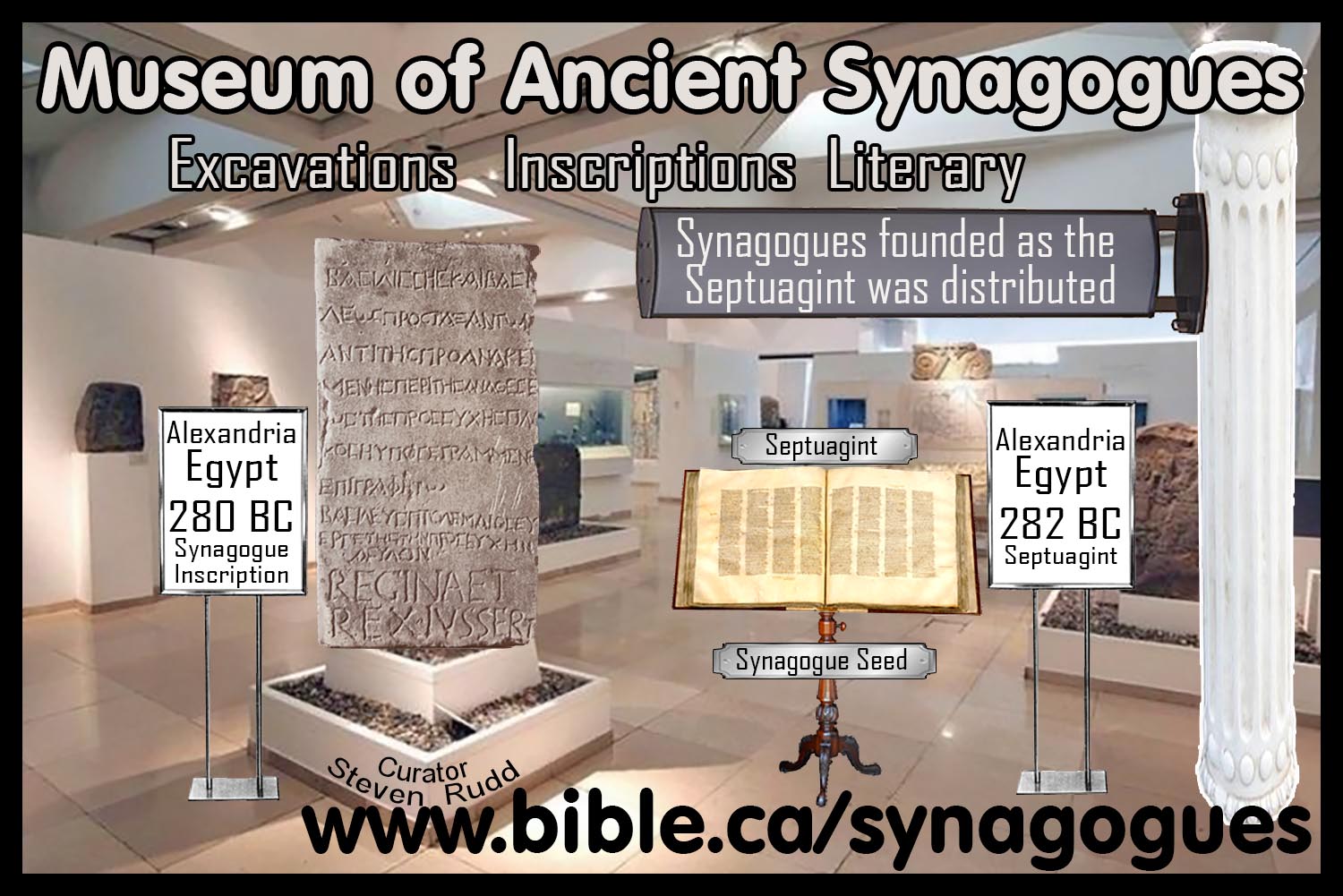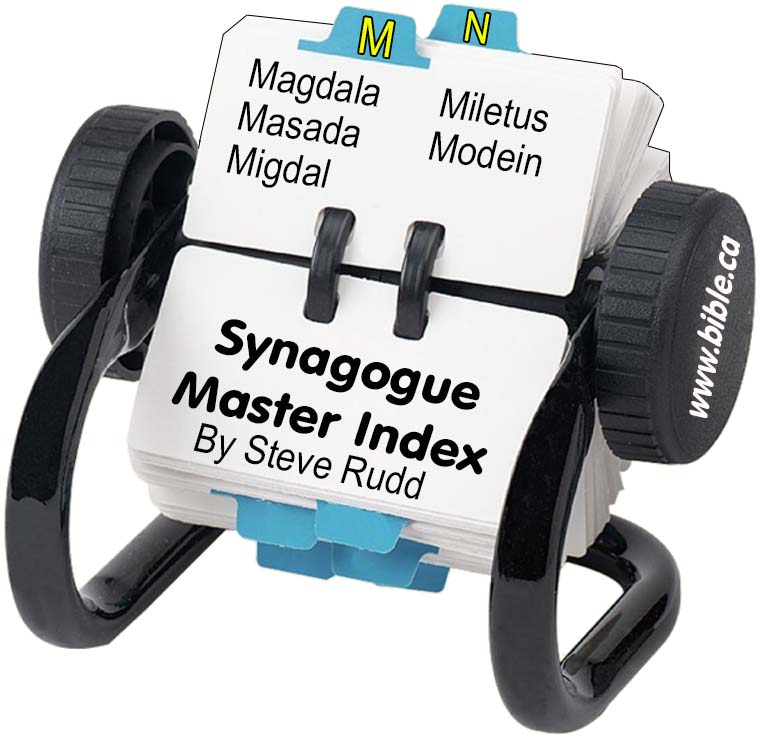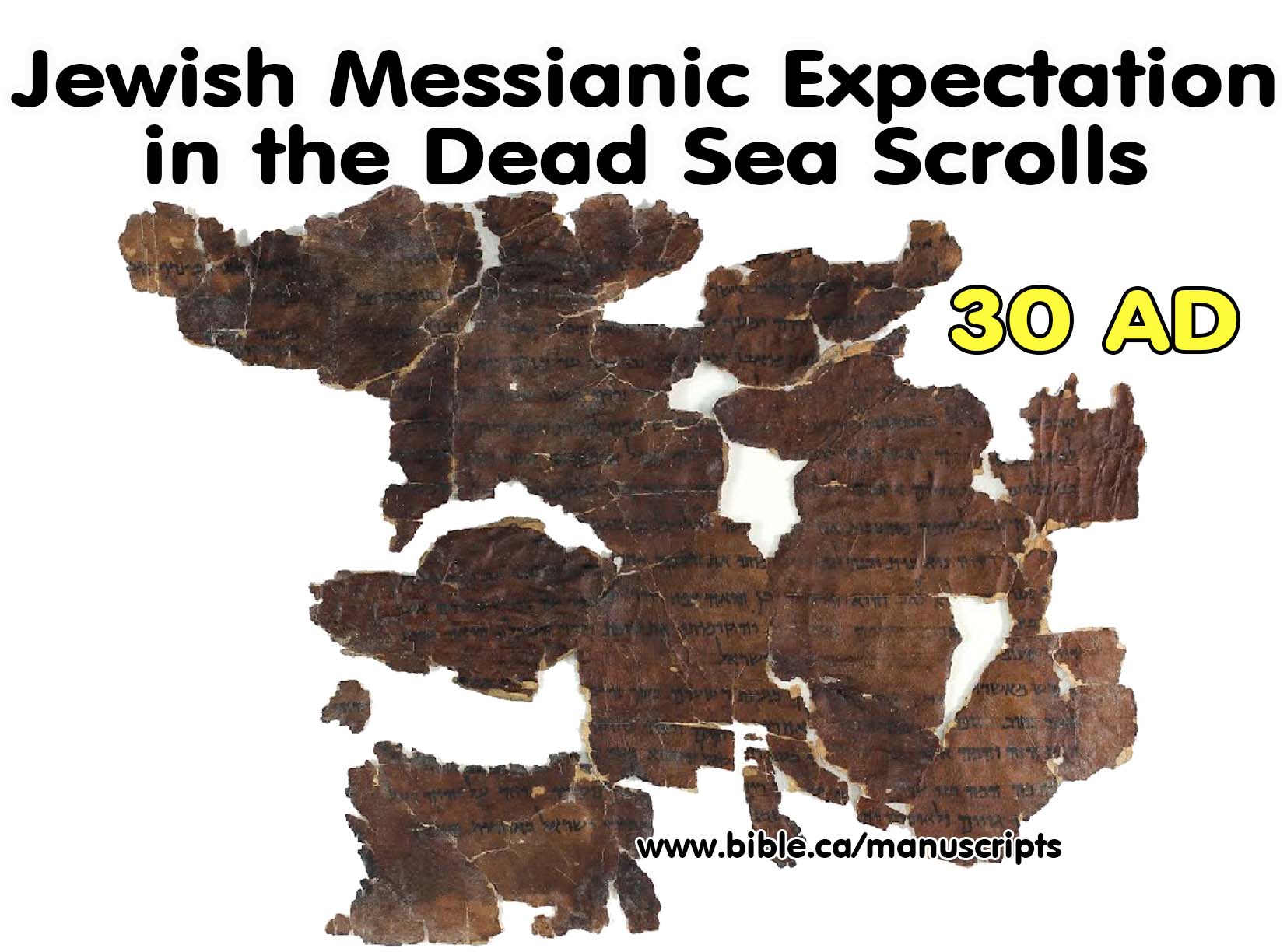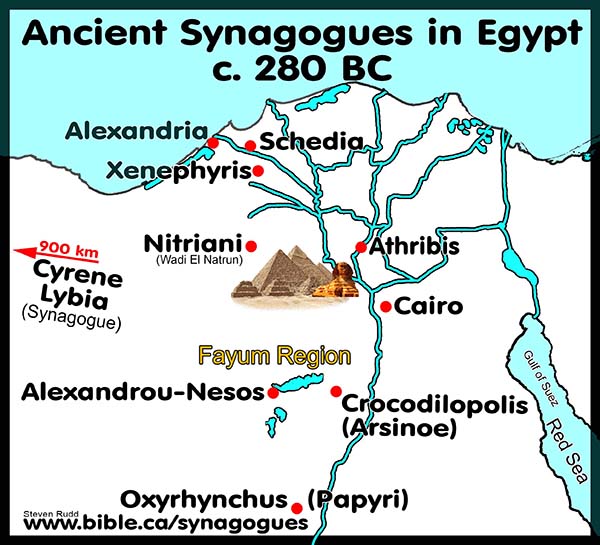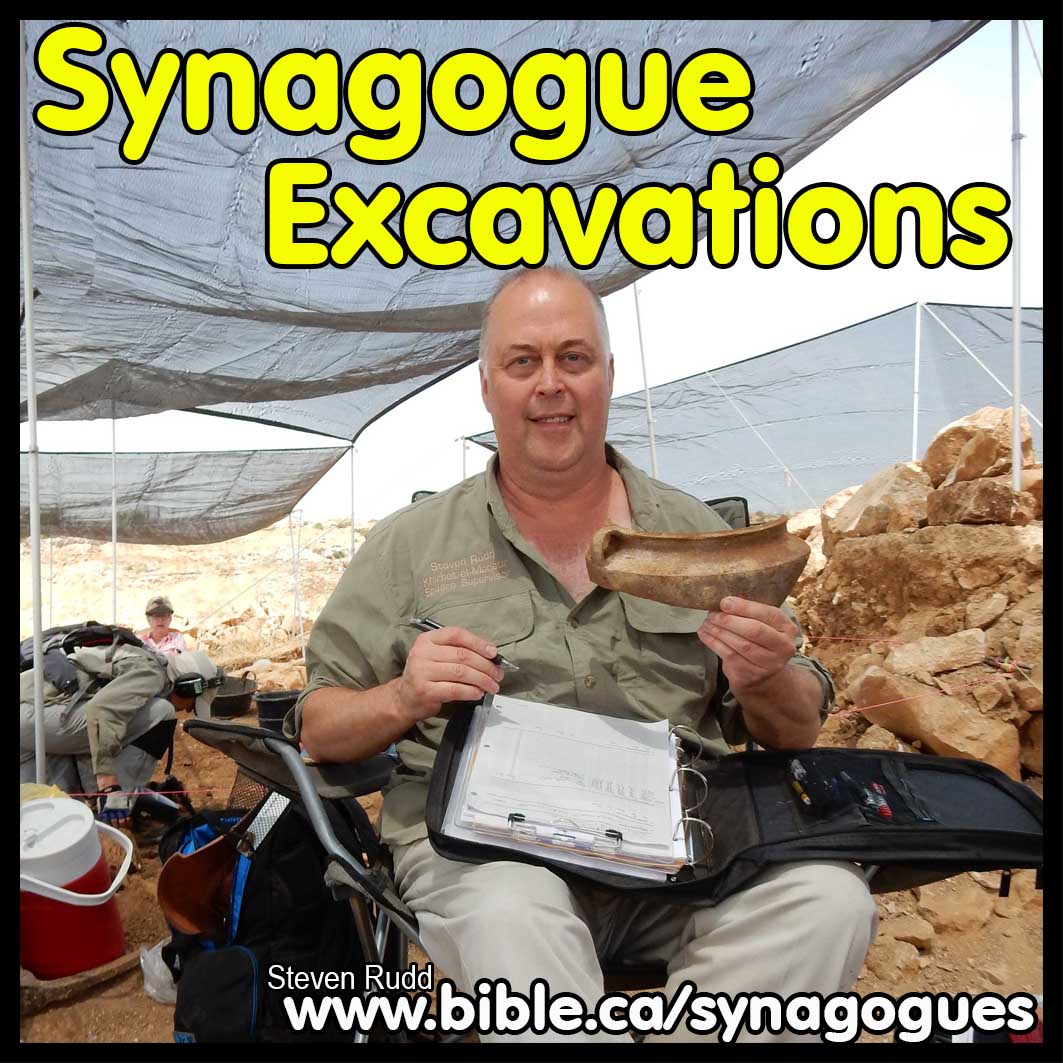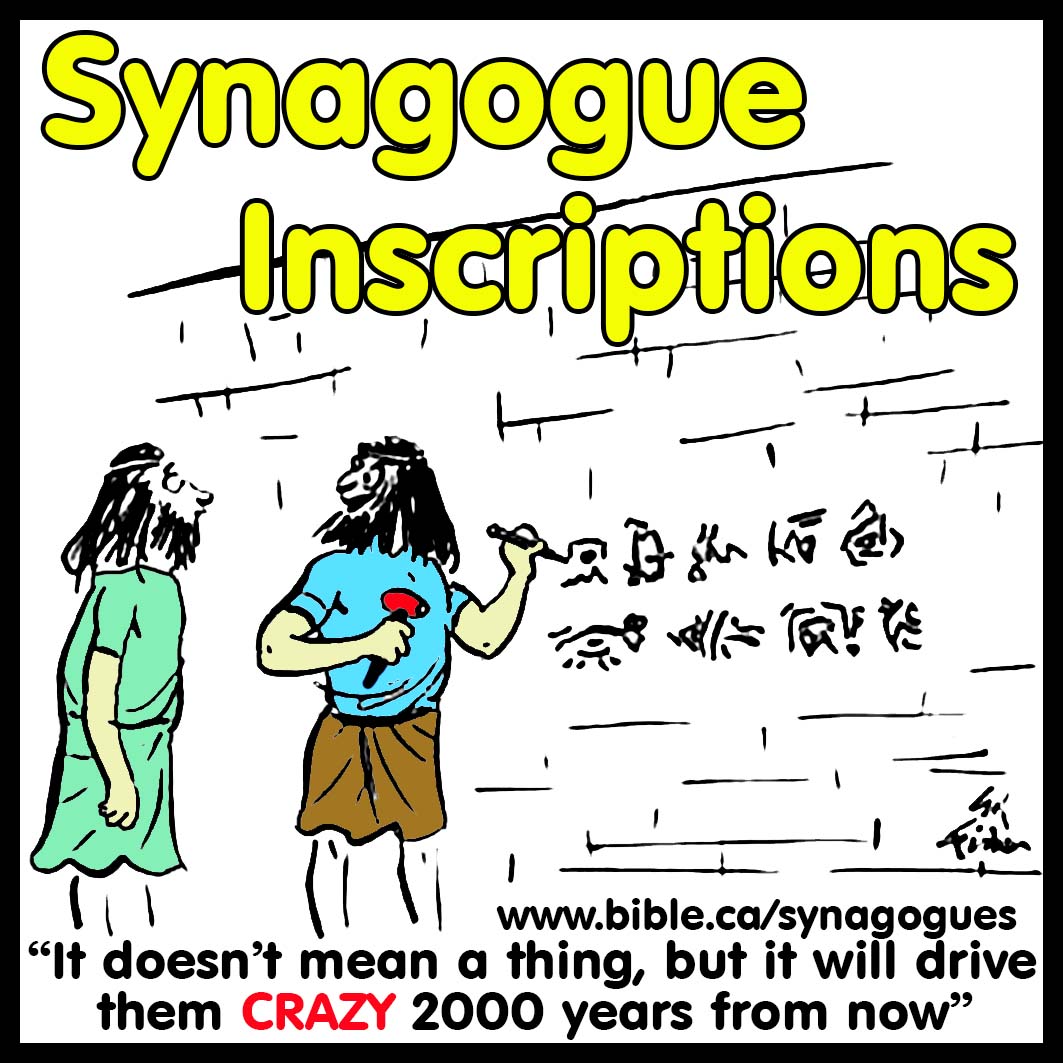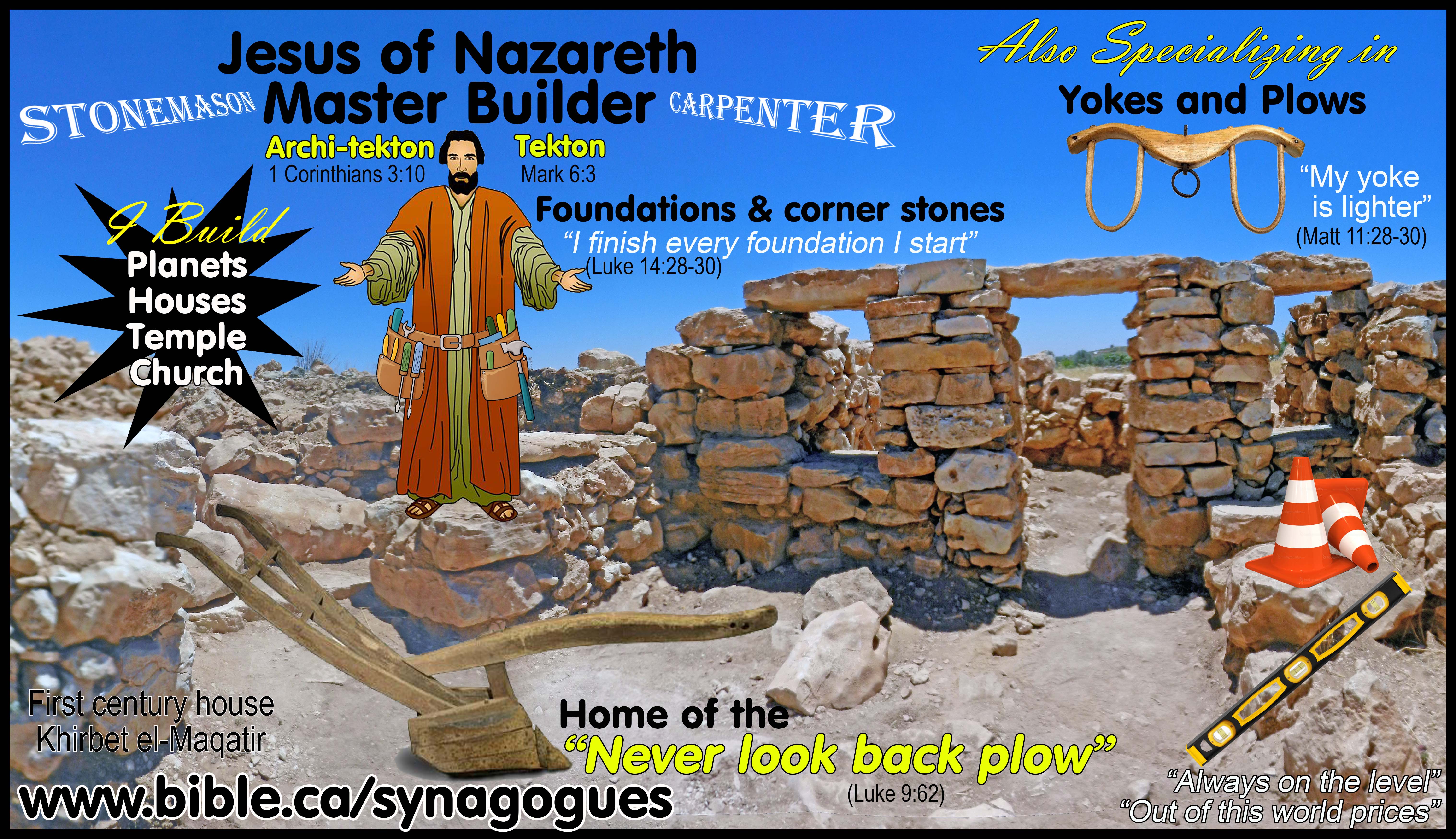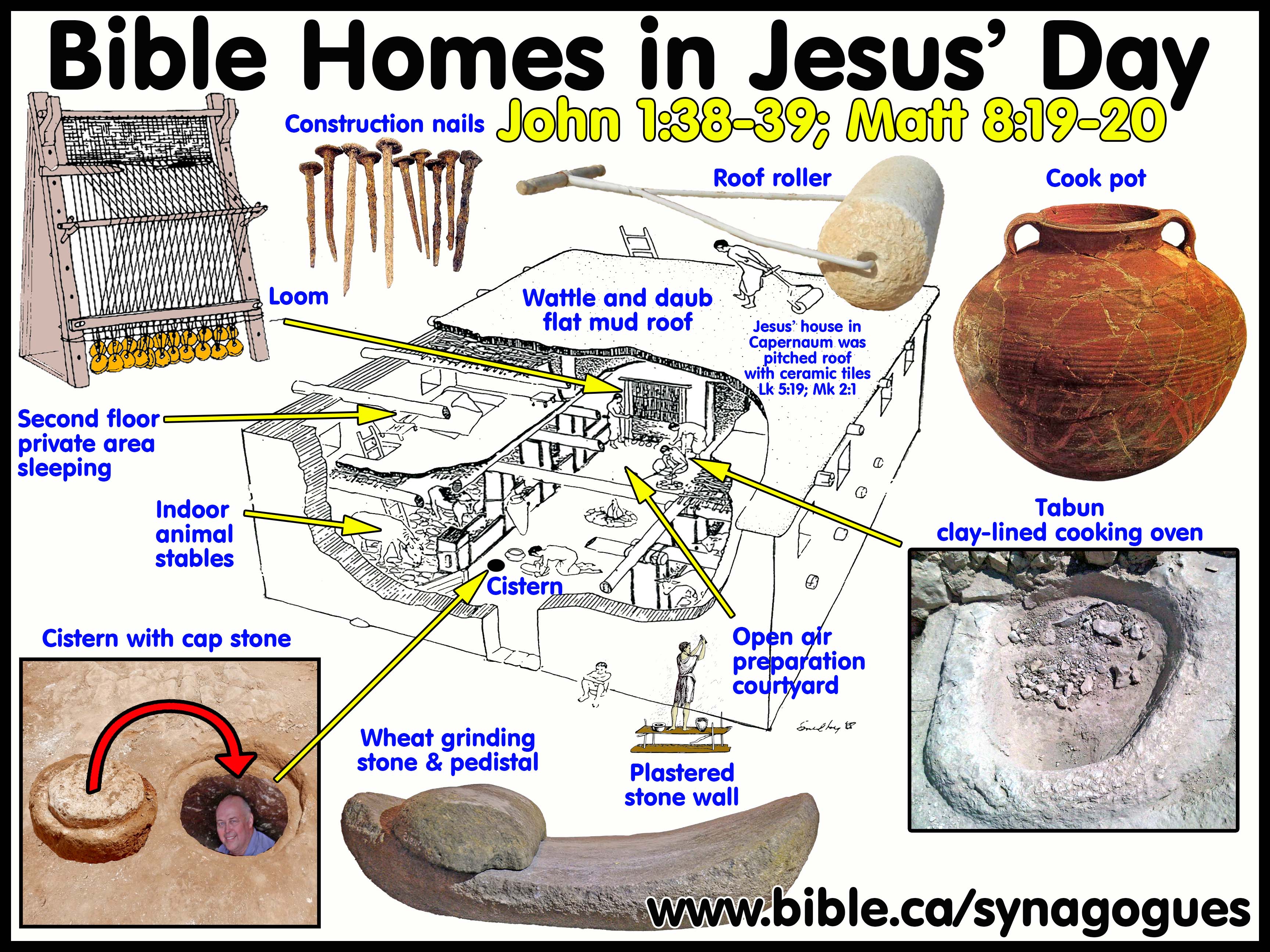|
Sacred Passover Meals in Synagogues: Lord’s Supper First Century Synagogues and churches |
“On this Rock, I will build My church”
Ancient Synagogue Worship and the Church
Synagogue worship was the prototype for Christian Church.
|
SACRED MEALS, NO COMMON MEALS IN SYNAGOGUES |
A. Communal meals and food preparation: Passover, unleavened bread ovens: “maẓẓot”
1. Three times a year the Jews would have sacred meals like the Passover:
a. “Speak to all the congregation of Israel, saying, ‘On the tenth of this month they are each one to take a lamb for themselves, according to their fathers’ households, a lamb for each household. ‘Now if the household is too small for a lamb, then he and his neighbor nearest to his house are to take one according to the number of persons in them; according to what each man should eat, you are to divide the lamb. ‘Your lamb shall be an unblemished male a year old; you may take it from the sheep or from the goats. ‘You shall keep it until the fourteenth day of the same month, then the whole assembly of the congregation of Israel is to kill it at twilight. ‘Moreover, they shall take some of the blood and put it on the two doorposts and on the lintel of the houses in which they eat it. ‘They shall eat the flesh that same night, roasted with fire, and they shall eat it with unleavened bread and bitter herbs. ‘Do not eat any of it raw or boiled at all with water, but rather roasted with fire, both its head and its legs along with its entrails. ‘And you shall not leave any of it over until morning, but whatever is left of it until morning, you shall burn with fire. ‘Now you shall eat it in this manner: with your loins girded, your sandals on your feet, and your staff in your hand; and you shall eat it in haste—it is the Lord’s Passover." (Exodus 12:3–11)
b. “These services included: social and political gatherings, religious instruction, Torah reading and prayer, collecting monies for the Temple and for local needs, communal meals, a hostel, as well as a local archive. … At the New Moon or the end of the Sabbath, the synagogue or an adjacent room served as a dining room.” (Ancient Synagogues - Archaeology and Art: New Discoveries and Current Research, Rachel Hachlili, p17, 2013 AD)
2. The unleavened bread is called “maẓẓot” and is baked by the Jews in their synagogues.
a. PASSOVER MAZZOT BREAD: “Now it does not please me that such decrees should be made against our friends and confederates, whereby they are forbidden to live according to their own customs, or to bring in contributions for common suppers and holy festivals, while they are not forbidden so to do even at Rome itself; for even Caius Caesar, our imperator and consul, in that decree wherein he forbade the Bacchanal rioters to meet in the city, did yet permit these Jews and these only, both to bring in their contributions, and to make their common suppers.” (Josephus, Antiquities 14.214-215)
b. Non-religious, social, “Common meals” were not eaten inside Synagogues but dining halls were often located directly adjacent or near the worship hall.
c. Early synagogues did have adjoining areas where sacred meals were eaten on Passover etc.
d. Early synagogues may have been used for weddings as seen in the 6 empty stoneware pots at the Cana wedding of John 2. Stoneware was used specifically for Jewish ritual purity. The last supper of Jesus was probably served with stoneware cups and plates. The fact that they were empty, indicates they were not used as part of the catering of the wedding but were in a room adjoining the synagogue.
e. When Josephus says common suppers, he does not mean a “common meal” like a pot luck for social purposes, but COMMUNAL meals that everyone partook of like the Passover or the Communion in the church. Remember the Greek word for “Communion” used for the Lord’s supper means a “communal sharing”.
3. SYNAGOGUE KITCHENS: “Mazzot Ovens”
a. Maẓẓot is unleavened bread baked by the Jews in their synagogues. It was important to first century ritual purity.
b. Kitchens in church buildings and synagogues are AUTHORIZED as long as you only use it to bake the “Passover Mazzot” and the “Communion unleavened bread” for the sacred services.
c.
Several synagogues had ovens: Masada, Ostia room G.
Archeological Excavation Top plans and Details for Masada
and Ostia
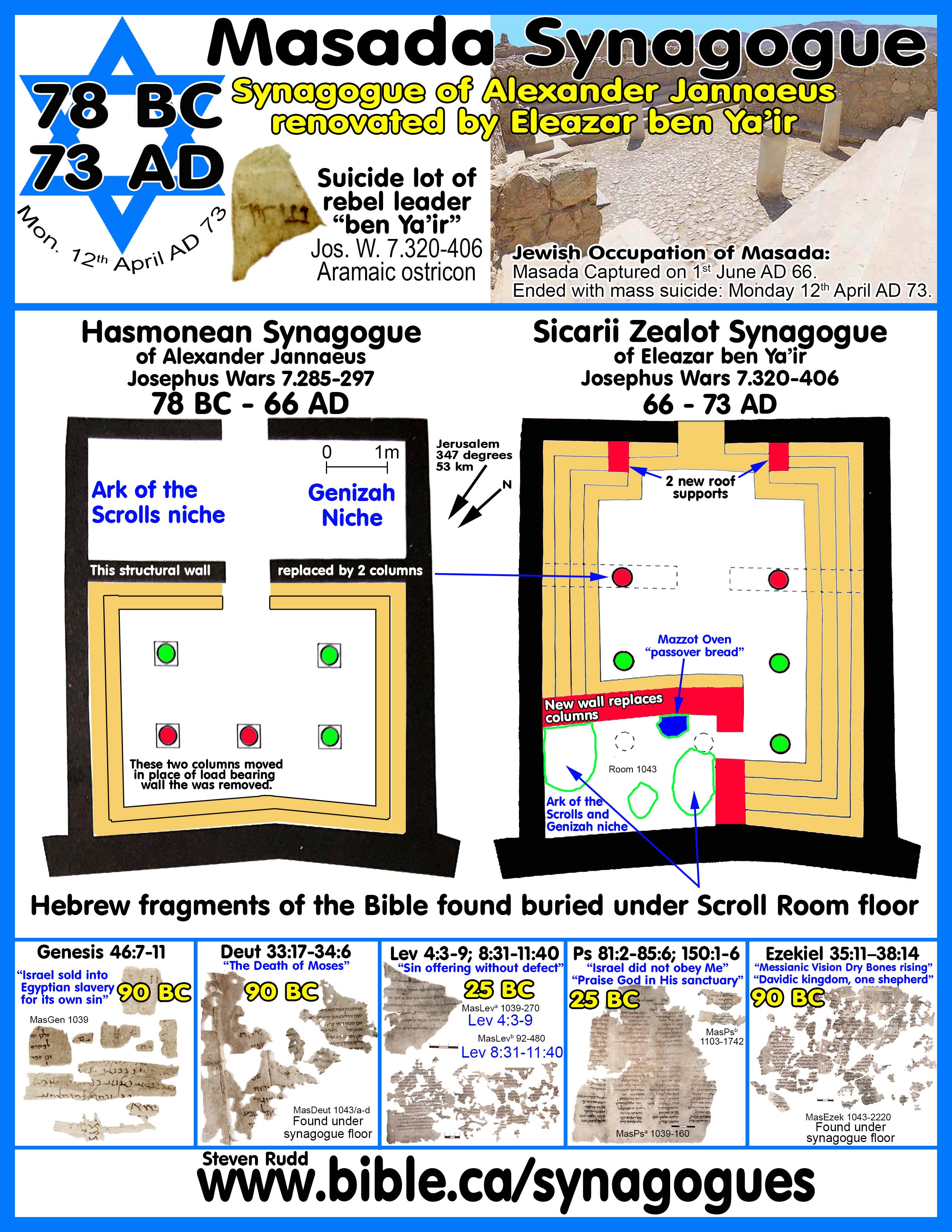

4. Delos 54 BC: “Julius Caius, praetor [consul] of Rome, to the magistrates, senate, and people of the Parians, sendeth greeting. The Jews of Delos, and some other Jews that sojourn there in the presence of your ambassadors, signified to us, that, by a decree of yours, you forbid them to make use of the customs of their forefathers, and their way of sacred worship. (214) Now it does not please me that such decrees should be made against our friends and confederates, whereby they are forbidden to live according to their own customs, or to bring in contributions for common suppers and holy festivals, while they are not forbidden so to do even at Rome itself; (215) for even Caius Caesar, our imperator and consul, in that decree wherein he forbade the Bacchanal rioters to meet in the city, did yet permit these Jews and these only, both to bring in their contributions, and to make their common suppers..” (Josephus, Antiquities 14.213-215, decree 54 BC)
a. “It is difficult to determine the nature of these [mentioned by Josephus in Antiquities 14.214] meals. Were they holiday feasts, meals for transients and visitors, or events sponsored by local Jewish associations or individuals? Alternatively, they might have been regular communal gatherings on the Sabbath and perhaps New Moon. Or perhaps they were all of the above in various permutations over time and place. Whatever the case, one fact remains eminently clear from the documents quoted by Josephus: These meals were recognized by Romans and Jews alike as important communal activities that played an integral part in the corporate life of the Jews.” (The Ancient Synagogue, Lee Levine, p141, 1999 AD)
5. Synagogues and first century church assemblies were for SPIRITUAL ACTIVITIES ONLY: Common meals were not permitted in synagogues
a. “The rabbis taught: [Regarding] synagogues: One may not behave in a lightheaded manner in them; one may not eat in them; and one may not drink in them; and may not dress up in them; and one may not stroll in them; and one may not enter them in the [season of the] sun, because of the sun, or in the [season of the] rain, because of rain; and one may not conduct mourning in them for an individual. But one may read [i.e., the Bible] in them; and one may study [i.e., the Mishnah] in them; and one may conduct public mourning there.” (Babylonian Talmud, b. Meg. 4:4, I.1.A–C)
b. “MISHNAH-TRACTATE MEGILLAH 4:4 A. MOREOVER, SAID RABBI JUDAH: A SYNAGOGUE THAT HAS BEEN DESTROYED: ONE MAY NOT MOURN IN IT; AND ONE MAY NOT SPREAD OUT ROPES IN IT; AND ONE MAY NOT SPREAD TRAPS IN IT; AND ONE MAY NOT SPREAD FRUIT ON ITS ROOF TO DRY: 1. I:1: The rabbis taught: Regarding synagogues: One may not behave in a lightheaded manner in them; one may not eat in them; and one may not drink in them; and may not dress up in them; and one may not stroll in them; and one may not enter them in the season of the sun, because of the sun, or in the season of the rain, because of rain; and one may not conduct mourning in them for an individual. But one may read i.e., the Bible in them; and one may study the Mishnah in them; and one may conduct public mourning there. Said R. Judah: When? When they are populated; But when they are destroyed, one must leave them alone, and blades of grass grow in them, but one should not pluck them out, because of anguish (T 2:18). a. I:2: The synagogues in Babylonia are built on condition, and even so, one should not conduct oneself lightheadedly in them. b. I:3: And one should not get dressed up there: Said Rava: Sages and their students are permitted to do so, as said R. Joshua ben Levi: What is the meaning of the “house of the rabbis”? The home of the rabbis. c. I:4: and one may not enter them in the season of the sun because of the sun, or in the season of the rain, because of rain: Similarly, Ravina and Rav Ada bar Matana were standing and asking Rava a question. A downpour came; they entered the synagogue.” (Babylonian Talmud, b. Meg. 4:4, I.1–I.5)
c. “A And further did R. Judah state, “A synagogue which was destroyed—they do not (1) carry out a lamentation for the dead in it. B “And they do not (2) twist ropes in it, C “and they do not (3) spread out nets [to dry] in it, D “and they do not (4) spread out produce on its roof, E “and they do not (5) make it into a public shortcut. F “For it is written, I will bring your sanctuaries to desolation (Lev. 26:31)— G “they remain sanctified even when they are desolated. H “If grass grew up in it, one should not cut it, because of grief.”” (Mishnah, m. Megilla 3:3)
d. “Said R. Hiyya bar Ba, “R. Yohanan cursed the women who spread out their clothing [to dry] over the airspace of a schoolhouse.” [III:1 A] [With reference to M. 3:3/I,] Samuel said, “If one entered a synagogue not in order to use it as a shortcut, it is permitted to use it as a shortcut.” [III:2 A] It has been taught [in the Tosefta’s version]: Synagogues―they do not behave with them frivolously. [B] One should not go into them on a hot day on account of the heat, or on a cold because of the cold, or on a rainy day because of the rain. [C] They to not eat or drink in them, nor to they sleep in them, nor do they take a stroll in them, nor to they derive benefit from them. [D] But they read [Scripture] in them, repeat [Mishnah-traditions] in them, and expound [biblical lessons] in them [T. Meg. 2:18A–D]. [III:3 A] R. Joshua b. Levi said, “Synagogues and schoolhouses belong to sages and their disciples.” (Jerusalem Talmud, y. Meg. 3:3, II.1.B–III.3.A)
B. REPLACEMENT THEOLOGY: Yearly Jewish Passover is REPLACED by weekly Christian communion:
1. Weekly Church communion replaced yearly Jewish Passover
a. WEEKLY COMMUNION SERVICE: "On the first day of the week, when we were gathered together to break bread, Paul began talking to them, intending to leave the next day, and he prolonged his message until midnight." (Acts 20:7)
b. COMMUNION UNLEAVENED BREAD: "For I received from the Lord that which I also delivered to you, that the Lord Jesus in the night in which He was betrayed took bread; and when He had given thanks, He broke it and said, “This is My body, which is for you; do this in remembrance of Me.” In the same way He took the cup also after supper, saying, “This cup is the new covenant in My blood; do this, as often as you drink it, in remembrance of Me.” For as often as you eat this bread and drink the cup, you proclaim the Lord’s death until He comes. Therefore whoever eats the bread or drinks the cup of the Lord in an unworthy manner, shall be guilty of the body and the blood of the Lord. But a man must examine himself, and in so doing he is to eat of the bread and drink of the cup. For he who eats and drinks, eats and drinks judgment to himself if he does not judge the body rightly." (1 Corinthians 11:23–29)
c. The Lord’s Supper is a memorial meal that remembers Jesus “passing over” our sins with His blood He shed on the cross just like Passover is a memorial meal that remembers the 10th plague of Egypt when the death angel saw the blood on the doors and “passed over” and let them live.
d. It is important to remember that Moses commanded an annual Passover meal.
e. Using the Synagogue for this meal would be as authorized as the Lord’s Supper in the church every Sunday.
2. Common meals forbidden on synagogue or church property: 1 Corinthians 11:34
a. The early Christians and Jews at their common meals BEFORE or AFTER the Sabbath/Sunday assembly except when Jews had annual sacred Passover meals under divine direction.
b. "If anyone is hungry, let him eat at home, so that you will not come together for judgment." (1 Corinthians 11:34)
c. The first century Christians and Jews DID NOT use their meeting areas as profane food consumption facilities.
3. SOCIAL GOSPEL FORBIDDEN: Using the church for social, entertainment or secular reasons violates law:
a. These principles are true if the synagogue/church is owned, rented or in a public park.
b. Synagogues and churches are not a place for entertainment and jokes: “One may not behave in a lightheaded manner in them” (b. Meg. 4:4)
c. Synagogues and churches are not places for fashion statements. The focus is on the inward spiritual not the outward carnal: “may not dress up in them” (b. Meg. 4:4)
d. Synagogues and churches are places of public funerals but not private mourning. Again the focus is on collective no individual activity: “one may not conduct mourning in them for an individual … and one may conduct public mourning there [funeral service]” (b. Meg. 4:4)
e. Synagogues and churches are not to be used for relief of public social assistance “one may not enter them in the [season of the] sun, because of the sun, or in the [season of the] rain, because of rain” (b. Meg. 4:4)
f. “Synagogues and churches are not to be used for secular activities: “And they do not (2) twist ropes in it, C “and they do not (3) spread out nets [to dry] in it, D “and they do not (4) spread out produce on its roof” (Mishnah, m. Megilla 3:3)
g. Synagogues were unused and empty most of the time just like churches
4. “USING THE SYNAGOGUE ONLY A FEW HOURS A WEEK BAD STEWARDSHIP OF THE LORD’S MONEY”
a. These rules were in force in early synagogues in spite of those who argued “the Lord’s money was not being used to its fullest”.
b. Synagogues and church buildings are for the sacred not the common.
5. We must have Bible authority for everything we do in the church:
a. We have no authority today in the church to use the Lord’s money for church kitchen’s used to prepare pot luck’s and common meals.
b. We do have authority for church kitchens used exclusively for preparing the Lord’s supper by baking the unleavened bread in a church owned oven and keeping the grape juice cold in a church owned fridge.
c. A church building is for prayer, Bible reading, teaching, singing, communion and taking a freewill offering of money. Anything more than this is sin.
a. This Jewish practice of eating before or after worship is common in churches today in the practice of:
b. Driving to restaurants after church
c. worshipping in a house living room then moving to kitchen to eat: it’s a private house not funded by the church.
d. worshipping in basement floor of house them moving to main floor for pot luck: it’s a private house not supported from the church treasury.
6. Ancient synagogues were never used for secular purposes and early churches followed this pattern.
7. Secular meals in the church building forbidden: 1 Corinthians 11:20-34
a. "Therefore when you meet together, it is not to eat the Lord’s Supper, for in your eating each one takes his own supper first; and one is hungry and another is drunk. What! Do you not have houses in which to eat and drink? Or do you despise the church of God and shame those who have nothing? What shall I say to you? Shall I praise you? In this I will not praise you. … "So then, my brethren, when you come together to eat, wait for one another. If anyone is hungry, let him eat at home, so that you will not come together for judgment. The remaining matters I will arrange when I come." (1 Corinthians 11:20-34)
b. "Therefore whoever eats the bread or drinks the cup of the Lord in an unworthy manner, shall be guilty of the body and the blood of the Lord. But a man must examine himself, and in so doing he is to eat of the bread and drink of the cup. For he who eats and drinks, eats and drinks judgment to himself if he does not judge the body rightly. For this reason many among you are weak and sick, and a number sleep. But if we judged ourselves rightly, we would not be judged. But when we are judged, we are disciplined by the Lord so that we will not be condemned along with the world." (1 Corinthians 11:27-32)
c. IMPORTANT POINT FOR CHRISTIANS: While Jews arrived HUNGRY at the synagogue to be filled by their annual sacred Passover meals that included roasted lamb, unleavened bread and unleavened grape juice, Christians were to EAT AT HOME and arrive at the church UNHUNGRY then eat the sacred weekly unleavened communion bread the grape juice.
8. Notice the Jews used unleavened grape juice in their Passover meals:
b.
Using wine or grape juice with any leaven is unscriptural and a
violation of how Christians are to break bread in weekly communion!

9. There is no authority to use the church treasury money for entertainment purposes.
a. It is unscriptural to refer to church pot luck meals as “fellowship” since the word is never used as such in the Greek New Testament AND always applies to the spiritual relationship between Christians and God.
b. The Jewish Mishnah and Talmud both do not allow common meals eaten in the synagogues.
10. Finally, notice that the very first “church building” was the Jerusalem Temple for very first Christians shortly after the Day of Pentecost in 33 AD, but they ate their common meals separate from the place of worship in homes:
a. "Day by day continuing with one mind in the temple, and breaking bread from house to house, they were taking their meals together with gladness and sincerity of heart," (Acts 2:46)
b. Food is a great way of developing close personal relationships with your fellow brothers and sisters in Christ, do Bible things in Bible ways and keep common meals separate from the church building.
C. Application for the church today:
1. Its ok for the church to have a food bank for benevolence, as long as it is for Christians only and widows who meet the strict criteria of 1 Tim 5. If you want to help non-Christian widows, sell your house and give them the money or start a privately funded old folks home.
2. Its ok the church to run a hostile for visiting out of town Christians and preachers for gospel meetings but its not ok to start a hotel that charges discounted rates to random European backpackers travelling the world for fun. Many churches have church owned manses.
3. Its ok for the church to have storage buildings for scripture, books, bible libraries but its not ok to start a public “U-Store It” business. Most churches have libraries and storage rooms.
4. Its ok for the church to have civic style meetings for non-spiritual matters that directly relate to Christians (Acts 6), but its not ok to allow outside civic governments to use the church as a polling station for modern elections or all candidates meetings for city mayor. Disputing local members will often meet with the elders at the church building to resolve civic disputes.
5. Its ok for the church to get members to donate household goods and clothing for other local needy members, but its not ok to start a public thrift store that accepts donations from non-Christians to resell the goods for profit that is used to fund the construction of new church buildings or missionaries oversees or Bibles.
6. Its ok for a church to have a fridge and stone in the church building as long at it is used exclusively to bake the communion unleavened bread and keep the grape juice cold so it doesn’t spoil. Most churches have a fridge to store the Lord’s supper elements.
7. Its ok for money from the church treasury to be given to for occasional “one time needs” of any Christian anywhere, but it never ok to give a single dollar to any non-Christian from the church treasury. Churches regularly give money for medical emergencies of members.
8. Its ok for one church to send money to another church oversees to help the local Christians recover from disaster relief, it is not ok for any church to give money to the red cross or any generic relief agency. Christians are free to donate privately to the Red Cross.
9. Its ok for one church to send money to another recipient church where members are in need of humanitarian relief, but its not ok to send the money to rebuild African towns, build secular schools and provide medical aid for non-Christians. Benevolence from the church treasury cannot be used to support non-Christians the same way Jews only gave their benevolence to fellow needy Jews.
10. Its ok for a larger wealthy church to send money to a smaller needy church but its never ok for many smaller churches to send money to one larger and more wealthy “sponsoring church” that has much more money in its own church treasury, than all the smaller churches. A small “poorer” church sending money to a larger “richer” church is directly opposite to the New Testament pattern, without scriptural authority and always wrong regardless of the “greater good” being done.
11. Its ok for a local church to spend money for evangelism but its never ok for many smaller churches to send their money a larger “sponsoring church” to create a pool of money to run a multimillion dollar national evangelism program on behalf of the many church churches. This is a violation of autonomy and is without any Bible authority.
12. Its ok for the church to have a full government certified kitchen, complete with halon fire extinguishing system, as long as the only food they prepare is the unleavened bread and grape juice for communion or qualified widows as per 1 Tim 5. While such a kitchen may be authorized, all would agree it is an outrageous waste of the Lord’s money which could be spent in other areas. However, a congregation of 10,000 Christians would likely save time and money by having a large church kitchen with multiple ovens to bake the unleavened bread and bunker style fridges to store the grape juice and commercial dishwashers for washing communion cups for the for weekly communion.
13. Its ok for the church to gather for meals, as long as all the members already ate at home and are not hungry before they arrive to eat the Lord’s Supper. While synagogues gathered three times a year for sacred “full meals” of lamb that satisfied hunger, such was outlawed by the Holy Spirit in the church.
14. Its ok for a the church to install a passenger pigeon coop for communications, but today, its probably better to install phones in the offices and the internet at the pulpit, given it is much faster and way less messy.
15. Its ok to dig a well and install a drinking water fountain in the church building for members but its not ok for a church to install clean drinking water wells for non-Christians in third world towns that are dying from thirst. If you really care, you are free to sell your house, fly over and save the town with your own personal money by digging local water wells.
16. Its ok for a church to run a fully accredited university, as long as it is “tuition free” and funded only through weekly freewill offerings of Christians Sunday morning and teaches only Bible classes.
17. Its ok for a church to install a mikveh (baptistry) but its not ok for a church to construct an Olympic size public swimming to attract outside young families to the Sunday services by offering midweek swimming lessons for half the going rate at other civic swimming pools. The church should not be in competition with the local YMCA in providing social needs of the local non-Christian community.
By Steve Rudd 2017: Contact the author for comments, input or corrections
|
Jesus your messiah is waiting for you to come home! |
|
|
Why not worship with a first century New Testament church near you, that has the same look and feel as the Jewish Synagogue in your own home town. As a Jew, you will find the transition as easy today as it was for the tens of thousands of your forefathers living in Jerusalem 2000 years ago when they believed in Jesus the Nazarene (the branch) as their messiah. It’s time to come home! |
|
By Steve Rudd: Contact the author for comments, input or corrections.
Go to: Main Ancient Synagogue Start Page


